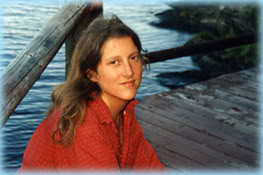Annie Finch can’t be a new formalist, precisely because she’s passionate both about the new and about form. She is also one of the great risk-takers in contemporary poetry, right up there with Lee Ann Brown & Bernadette Mayer in her willingness to completely shatter our expectations as readers. Back on June 8, I looked at a note Jennifer Moxley uses as a postscript to her own fabulous collection Often Capital,
What one sees here is the trace of Moxley unfolding the public life of her poetry every bit as if it were the sequencing of a narrative.
Moxley wants people to read Often Capital, but she also wants them to understand where it fits into the larger arc of her work, not as the newest work, but as “early.” Finch echoes this strategy in part through an introduction to new book, The Encyclopedia of Scotland, explaining that it originally was composed in 1980 & ’81, but Finch’s note echoes Moxley’s only in part.¹ Often Capital, for example, can be read as predicting Moxley’s subsequent development as a poet without forcing the reader to radically re-orient his or her understanding of that poetry. The Encyclopedia of
The easiest way to describe The Encyclopedia of Scotland is as an attempt to thrust one’s poetry in all directions, directed largely by the sensual pleasures of language itself. As such, it bears a distant kinship with a number of disparate works, including those of Mina Loy & even the Baroness Else von Freytag-Loringhoven, Bob Brown & Bern Porter, Lee Ann Brown’s ventures into the ballad, Robert Duncan’s Stein imitations of the early 1950s, and, perhaps most closely, the ludic verse of the late Lynn Lonidier. Not, as I said, your typical new formalist fare.
Thus, for example, this passage from “Recessional,” which I quote in part because the text is all rightside up & none of it is drawn, making it citable for html.
Left these hills
Left the green hills to the night-time,
Left these hills
Left them for another
Left these hills
Left them a harmonica
Howling at the ocean
Left them green
but I am there, chinning the windowsill,
I call from the doors,
I meet in the walls
I laugh on the sills,
I dance on these hills
Woke up this morning
with lake water on my toes
with clouds on my fingers
I woke up and arose,
and I row,
and I row,
and I row.
The heart of Finch’s work, both here and in her later (read: “mature,” “formalist”)
poetry is her ear. Although there are sections here that clearly qualify as
visual poetry, Finch’s strengths are aural. Indeed, sound often dictates logic:
Digits will turn into finger,
and waves from our fingers dissolve into fins.
Digital time is more ink in the water,
and sometimes I wear a round watch.
Digits will turn into waves,
and waves from our fingers dissolve into fingers
We grow fins
as the poem goes on
I love my love, my love monitors everything I say,
oh my love teaches me to hesitate in the water
Your right hand is no culprit, it’s a lever in the wind.
There is, as this ode to self-pleasure attests, an impulse to the rhapsodic close to the heart of The Encyclopedia of
We haven’t had a poet so capable of combining control & excess since the young Robert Duncan.
The Encyclopedia of Scotland differs, perhaps, in the degree to which it errs on the side of excess, but fundamentally it demonstrates just how deep Finch’s commitment to language is. So it’s no surprise that her works in stricter (or, if you will, “more traditional”) forms demonstrate that same passion.
¹ Doubly intriguing is the fact that the jacket blurb to Encyclopedia is by Moxley, who reads it as anticipating “works such as Lisa Robertson’s Debbie: An Epic and Stacy Doris’ Paramour.”






